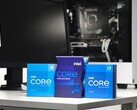The official specs for the Rocket Lake desktop CPUs from Intel that got leaked the other day seem to confirm that the i9-11900K is barely any different from the i7-11700K, except for slightly higher clocks. From what we understand, both processors are using the same die, so many analysts are now left wondering about the real reason behind this product segmentation. A reddit post made yesterday might shed some more light on this aspect. According to reddit user ZqV7, Intel appears to artificially limit the RAM controllers on all processors beneath the i9-11900K in order to somehow justify the price premium.
ZqV7 first points out that the official Intel slide with the Rocket Lake-S specs has a footnote that reads “i9-11900K(F) SKUs are DDR4-3200 Gear 1. All other SKUs are DDR4-3200 Gear 2. DDR4-2933 is Gear 1.” As explained in a previous article, this IMC Gear system is similar to AMD’s Infinity Fabric overclocking. Gear 1 is synchronous mode 1:1 and Gear 2 is asynchronous mode 1:2 (aka ½:1). The second mode usually allows for higher clock speeds, but introduces more latency that can affect performance, so it needs to be fine tuned. Now, corroborating this info with the Intel footnotes, it becomes clear that only the i9-11900K(F) SKUs run in DDR4-3200 1:1 mode, while the rest of the models will be forced to run in 1:2 mode.
Basing their analysis on the Anandtech review, ZqV7 further emphasises the impact of the artificially limited RAM controller on the performance of the non-i9K(F) SKUs:
Anandtech's 11700k would have at default run at 1:2 asynchronous IMC mode since they tested at the official Intel spec of DDR4-3200 which would have negatively affected their latency-sensitive benchmarks such as gaming. Anandtech of course thought the Rocket Lake spec was 3200 so they tested stock which it is, but misleading. The actual stock setting is 3200 1:2. Oddly enough Intel also says it supports 2933 1:1 instead of 3200 1:2 which would have been much faster.
This explains the poor gaming performance from Anandtech's review. The 'default' DDR4-3200 is 1:2 out of the box. Which is extremely odd considering you can set it to 1:1 in the bios... Anandtech could have run it 1:1 to get better results but that would be non-stock i.e. overclock.
Hopefully, these Gear settings can be disabled in the BIOS, so that Intel is not really misleadingly advertising the DDR4-3200 support across the entire Rocket Lake platform, but we cannot say this for sure until the processors and new Z590 motherboards become available.













